Vue如何操作dom?下面本篇文章给大家介绍一下Vue3中操作dom的四种方式,希望给大家有所帮助!

前端(vue)入门到精通课程:进入学习
Apipost = Postman + Swagger + Mock + Jmeter 超好用的API调试工具:点击使用
最近产品经理提出了很多用户体验优化的需求,涉及到很多dom的操作。
小张:“老铁,本来开发Vue2项目操作dom挺简单的,现在开发vue3项目,突然感觉一头雾水!”
我:“没事,原理都差不多,查查资料应该没问题的!”
至此将Vue3中dom操作常见的几种方式总结一下!(学习视频分享:vue视频教程)
通过ref直接拿到dom引用
<template> <div> <div ref="sectionRef"></div> </div> </template> <script setup> import {ref} from 'vue' const sectionRef = ref() </script>
登录后复制
通过对div元素添加了ref属性,为了获取到这个元素,我们声明了一个与ref属性名称相同的变量sectionRef,然后我们通过 sectionRef.value 的形式即可获取该div元素。
适用场景
单一dom元素或者个数较少的场景
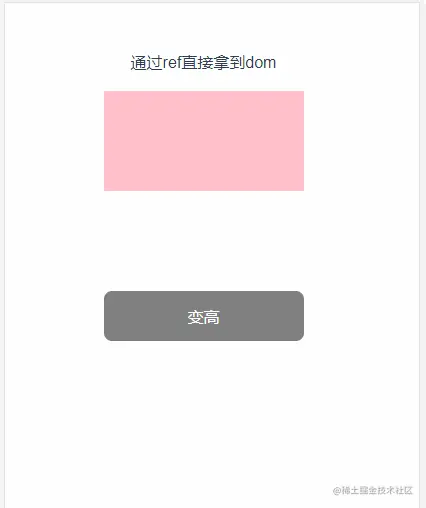
示例代码
<template> <div> <p>通过ref直接拿到dom</p> <div ref="sectionRef"></div> <button @click="higherAction">变高</button> </div> </template> <script setup> import {ref} from 'vue' const sectionRef = ref() let height = 100; const higherAction = () => { height += 50; sectionRef.value.style = `height: ${height}px`; } </script> <style scoped> .demo1-container { width: 100%; height: 100%; .ref-section { width: 200px; height: 100px; background-color: pink; transition: all .5s ease-in-out; } .btn { width: 200px; height: 50px; background-color: gray; color: #fff; margin-top: 100px; } } </style>
登录后复制
通过父容器的ref遍历拿到dom引用
<template> <div> <div ref="listRef"> <div @click="higherAction(index)" v-for="(item, index) in state.list" :key="index"> <span>{{item}}</span> </div> </div> </div> </template> <script setup> import { ref, reactive } from 'vue' const listRef = ref()
登录后复制
通过对父元素添加了ref属性,并声明了一个与ref属性名称相同的变量listRef,此时通过listRef.value会获得包含子元素的dom对象
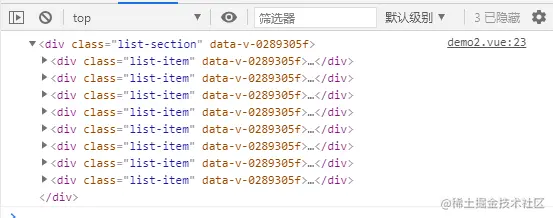
此时可以通过listRef.value.children[index]的形式获取子元素dom
适用场景
通过v-for循环生成的固定数量元素的场景
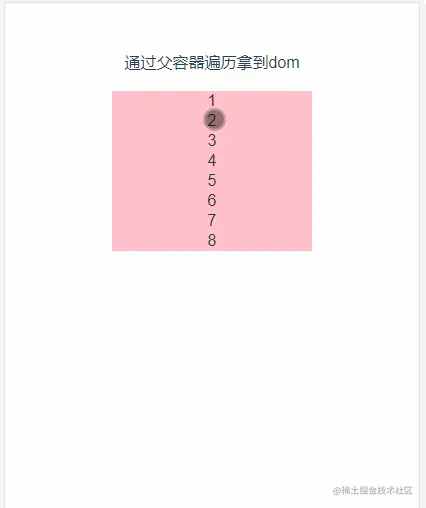
示例代码
<template> <div> <p>通过父容器遍历拿到dom</p> <div ref="listRef"> <div @click="higherAction(index)" v-for="(item, index) in state.list" :key="index"> <span>{{item}}</span> </div> </div> </div> </template> <script setup> import { ref, reactive } from 'vue' const listRef = ref() const state = reactive({ list: [1, 2, 3, 4, 5, 6, 7, 8] }) const higherAction = (index: number) => { let height = listRef.value.children[index].style.height ? listRef.value.children[index].style.height : '20px'; height = Number(height.replace('px', '')); listRef.value.children[index].style = `height: ${height + 20}px`; } </script> <style scoped> .demo2-container { width: 100%; height: 100%; .list-section { width: 200px; .list-item { width: 200px; height: 20px; background-color: pink; color: #333; transition: all .5s ease-in-out; display: flex; justify-content: center; align-items: center; } } } </style>
登录后复制
通过:ref将dom引用放到数组中
<template> <div> <div> <div :ref="setRefAction" @click="higherAction(index)" v-for="(item, index) in state.list" :key="index"> <span>{{item}}</span> </div> </div> </div> </template> <script setup> import { reactive } from 'vue' const state = reactive({ list: [1, 2, 3, 4, 5, 6, 7], refList: [] as Array<any> }) const setRefAction = (el: any) => { state.refList.push(el); } </script>
登录后复制
通过:ref循环调用setRefAction方法,该方法会默认接收一个el参数,这个参数就是我们需要获取的div元素
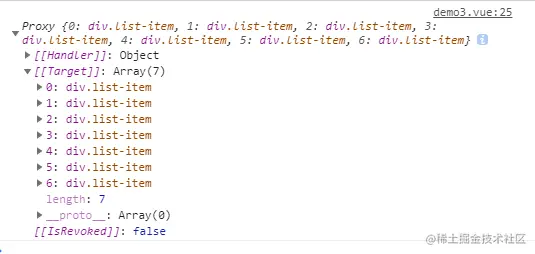
此时可以通过state.refList[index]的形式获取子元素dom
适用场景
通过v-for循环生成的不固定数量或者多种元素的场景
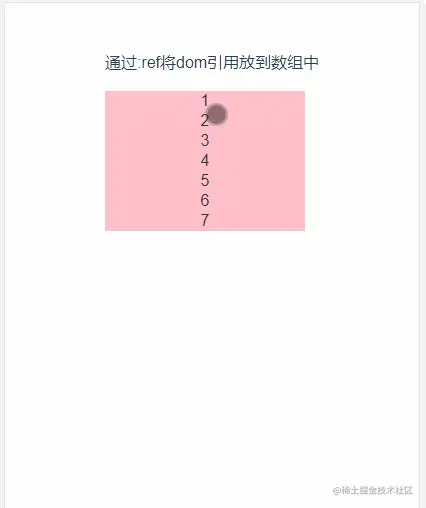
示例代码
<template> <div> <p>通过:ref将dom引用放到数组中</p> <div> <div :ref="setRefAction" @click="higherAction(index)" v-for="(item, index) in state.list" :key="index"> <span>{{item}}</span> </div> </div> </div> </template> <script setup> import { reactive } from 'vue' const state = reactive({ list: [1, 2, 3, 4, 5, 6, 7], refList: [] as Array<any> }) const higherAction = (index: number) => { let height = state.refList[index].style.height ? state.refList[index].style.height : '20px'; height = Number(height.replace('px', '')); state.refList[index].style = `height: ${height + 20}px`; console.log(state.refList[index]); } const setRefAction = (el: any) => { state.refList.push(el); } </script> <style scoped> .demo2-container { width: 100%; height: 100%; .list-section { width: 200px; .list-item { width: 200px; height: 20px; background-color: pink; color: #333; transition: all .5s ease-in-out; display: flex; justify-content: center; align-items: center; } } } </style>
登录后复制
通过子组件emit传递ref
<template> <div ref="cellRef" @click="cellAction"> <span>{{item}}</span> </div> </template> <script setup> import {ref} from 'vue'; const props = defineProps({ item: Number }) const emit = defineEmits(['cellTap']); const cellRef = ref(); const cellAction = () => { emit('cellTap', cellRef.value); } </script>
登录后复制
通过对子组件添加了ref属性,并声明了一个与ref属性名称相同的变量cellRef,此时可以通过emit将cellRef.value作为一个dom引用传递出去

适用场景
多个页面都可能有操作组件dom的场景
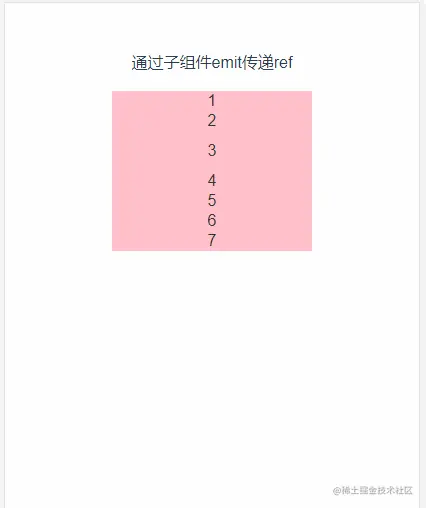
示例代码
<template> <div ref="cellRef" @click="cellAction"> <span>{{item}}</span> </div> </template> <script setup> import {ref} from 'vue'; const props = defineProps({ item: Number }) const emit = defineEmits(['cellTap']); const cellRef = ref(); const cellAction = () => { emit('cellTap', cellRef.value); } </script> <style scoped> .cell-item { width: 200px; height: 20px; background-color: pink; color: #333; transition: all .5s ease-in-out; display: flex; justify-content: center; align-items: center; } </style>
登录后复制
<template> <div> <p>通过子组件emit传递ref</p> <div> <Cell :item="item" @cellTap="cellTapHandler" v-for="(item, index) in state.list" :key="index"> </Cell> </div> </div> </template> <script setup> import { reactive } from 'vue' import Cell from '@/components/Cell.vue' const state = reactive({ list: [1, 2, 3, 4, 5, 6, 7], refList: [] as Array<any> }) const cellTapHandler = (el: any) => { let height = el.style.height ? el.style.height : '20px'; height = Number(height.replace('px', '')); el.style = `height: ${height + 20}px`; } </script> <style scoped> .demo2-container { width: 100%; height: 100%; .list-section { width: 200px; } } </style>
登录后复制
【相关视频教程推荐:vuejs入门教程、web前端入门】
 站长资讯网
站长资讯网